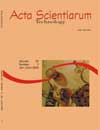Influence of acidity in MTBE synthesis on modified Beta zeolites
DOI:
https://doi.org/10.4025/actascitechnol.v23i0.2772Keywords:
MTBE, zeólita Beta, acidez, desaluminização, alumina extra-redeAbstract
Synthesis of MTBE on dealuminated and leaching Beta zeolites is provided. Hydrothermal and chemical dealumination of HBeta zeolite leads to less active catalysts due to a decrease in the total concentration of Brí¶nsted acid sites. Furthermore, it has been verified that elimination of highly dispersed non-framework alumina species present in HBeta samples, by acid treatment, decreases catalytic activity, even though the zeolite has shown a higher content of Brí¶nsted acid sites. It might be suggested that highly dispersed cationic non-framework aluminum species could interact with framework hydroxyls, generating Brí¶nsted acid sites with enhanced catalytic activity. Thus, zeolite HBeta showed a maximum MTBE yield at 70oC, superior to the commercial catalyst (resin Amberlyst 15) and to other zeolites studied, within the context of reaction conditions utilizedDownloads
Download data is not yet available.
Downloads
Published
2008-05-05
How to Cite
Gonzales, A. M., & Arroyo, P. A. (2008). Influence of acidity in MTBE synthesis on modified Beta zeolites. Acta Scientiarum. Technology, 23, 1407–1414. https://doi.org/10.4025/actascitechnol.v23i0.2772
Issue
Section
Chemical Engineering
License
DECLARATION OF ORIGINALITY AND COPYRIGHTS
I Declare that current article is original and has not been submitted for publication, in part or in whole, to any other national or international journal.
The copyrights belong exclusively to the authors. Published content is licensed under Creative Commons Attribution 4.0 (CC BY 4.0) guidelines, which allows sharing (copy and distribution of the material in any medium or format) and adaptation (remix, transform, and build upon the material) for any purpose, even commercially, under the terms of attribution.
Read this link for further information on how to use CC BY 4.0 properly.











8.png)




